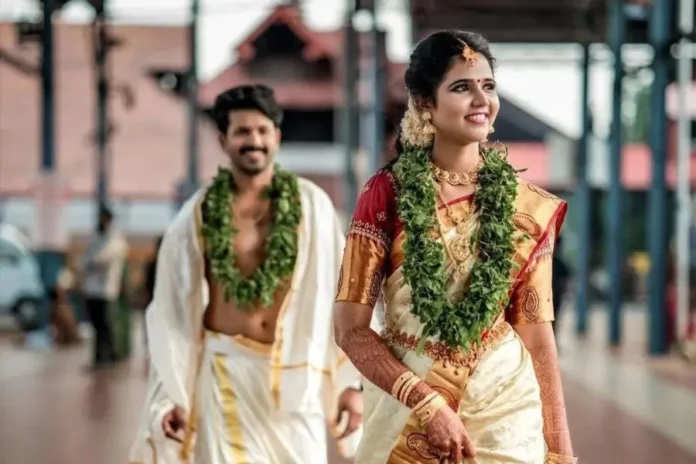As the groom wraps the Thali, or the sacred thread around the bride’s neck, prayers and blessings are showered upon the couple during Kalyanam, symbolizing their everlasting commitment, love, and respect – every note resonating with promises of a lifetime.
Amidst the pulsating beats of tradition and the sweet fragrance of jasmine, a divine South Indian wedding takes centre stage, weaving together moments of joy and everlasting love. The bride, adorned in her elegant kasavu saree, emanates an aura of understated elegance and simplicity, while the groom personifies poise and dignity in his traditional Mundu and Kasavu shirt. Aromatic strands of jasmine delicately cascade from intricately braided hair, scenting the atmosphere with a delightful fragrance. As the religious chants resound, the couple proclaims their eternal bond. From the enticing feast of Sadhya, which comprises a variety of exquisite vegetarian delights, to the frenetic beats of traditional music and dance, every moment vibrates with the vivid spirit of Kerala’s rich culture.
Among the numerous customs and rituals that enrich the occasion of a Hindu-Malayali wedding in Kerala, one that really stands out for its freshness and vibrant ceremonies is Kettu Kalyanam. This age-old tradition, strongly ingrained in the state’s cultural history, assembles families, communities, and cultures for an extravagant yet personal celebration.
Kettu Kalyanam, which literally translates as “tying the knot,” represents the sacred union of two souls, promising a lifetime of love, solidarity, and shared dreams. This ageless tradition is common among the Samanthan, Nair, Maarar, and Ambalavasi communities in the southern part of Kerala. Nischayam, or the official engagement ceremony marks the beginning of this auspicious occasion, where the families exchange gifts, and pour their unequivocal support for the union. The joyful festivities that follow bind not only the pair but also their families, forming a bond that stretches beyond the bride and groom.
Pre-Wedding Rituals
Nischayam
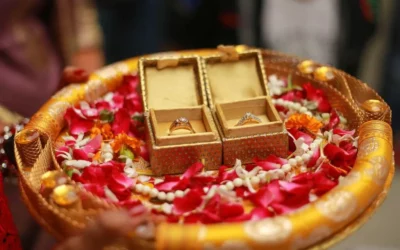
Nischayam, a momentous pre-wedding ceremony in the traditional Malayali wedding, marks the official engagement of the couple. The word “Nischayam” means “confirmation” or “decisiveness” symbolizing both families’ sincerity and willingness to proceed with the union. During this auspicious occasion, close relatives distribute gifts as a gesture to show their support and acceptance of the upcoming marriage. It is a joyous event during which the couple, accompanied by their loved ones, officially announces their desire to embark on a lifelong adventure. Nischayam sets the tone for the ensuing wedding rites, establishing the base for the blissful union that awaits the couple.
Naandi
Naandi, a ritual performed separately at the bride’s and groom’s houses, is a ceremonial prayer requesting the blessings of ancestors for a happy and harmonious wedding. It is carried out by the family priest, who recites sacred hymns and showers prayers upon the soon-to-be husband and wife for a prosperous marital life. Chanting Vedic hymns, practising sacred fire rites, and presenting flowers, fruits, and other auspicious offerings to Lord Shiva are all part of the ritual.
Udayasthamana
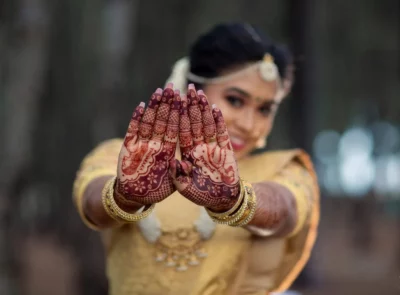
Udayasthamana is a grand pre-wedding feast organised by the bride’s family for the groom and his relatives. Udayasthamana, which means ‘day and night,’ is an elaborate celebration held at the bride’s home.
In this ritual, the bride is the centre of attention and is decked up with exquisite traditional attire, jewellery, and intricate henna designs. It is a joyous event as family members, close relatives, and friends gather to celebrate and bless the bride for her upcoming journey.
Wedding Day Rituals
Kalyana Payasam
The wedding day kicks off with the ritual of Kalyana Payasam. A sweet batter composed of milk, ghee, and jaggery is prepared and offered to the deities in exchange for their blessings. This ceremony represents the divine presence and implores their guidance for a fruitful and blissful marital journey.
Kettu
One of the most important aspects of Kettu Kalyanam is the Kettu ceremony, which comprises the pious act of tying the wedding thread (Minnu) around the bride and groom’s wrists. Kettu, which means “to tie,” refers to the symbolic connection between the bride and the groom. This ceremony is normally performed at the wedding venue in the presence of family members, close relatives, and guests. It is led by a priest who conducts the ceremonies with Vedic chants and prayers. During the Kettu ritual, the groom’s elder sister or any female member of the family ties a sacred thread made of gold, called Manthrakodi around the bride and groom’s wrists, symbolizing their eternal bond and commitment to each other.
Thali Kettu
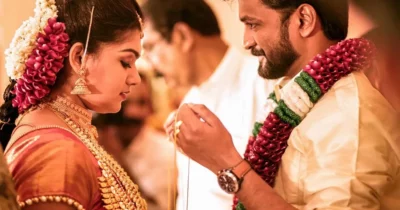
The ritual of Thali Kettu is a pivotal aspect of Kettu Kalyanam. Thali, also known as the “Mangalsutra” or the sacred thread, bears profound meaning reflecting the marital bond and commitment of the couple. The couple stands in front of the sacred fire, accompanied by their families and loved ones. The priest conducts rituals and chants mantras, invoking the blessings of the divine for the couple’s nuptials.
The groom wraps the sacred thread around the bride’s neck. Once the Thali is tied, prayers and blessings are showered upon the couple, symbolizing their everlasting commitment, love, and respect for one another.
Muhurtham and Mala Matral
Muhurtham refers to the most auspicious and carefully picked time for the wedding ceremony to begin, as decided by astrological considerations. The couple exchange garlands during Muhurtham, symbolizing their acceptance of each other as life partners. This exchange of garlands, called Mala Matral, signifies their love, companionship, and mutual respect. The ceremony also comprises the tying of the sacred wedding knot, known as Mangalya Bandhanam. The groom wraps a sacred thread around the bride’s neck to symbolize their eternal relationship and the groom’s commitment to the bride.
Pudava Koda
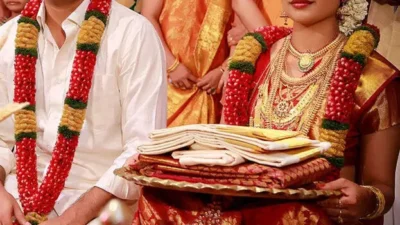
The groom’s family presents new garments, known as Pudava, to the bride in this rite. The bride then adorns herself in these outfits to symbolize her acceptance into the groom’s family and her new role as a married woman.
Ashirvadam
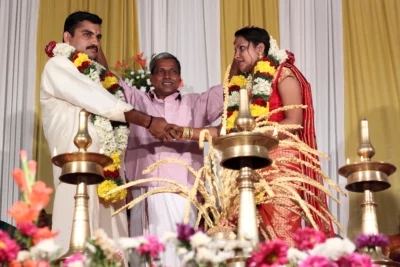
The wedding culminates with the Ashirvadam, in which the couple seeks blessings from their elders and loved ones. Family members shower them with rice and flowers, wishing them a prosperous and happy marriage.
Sadhya
Throughout the wedding, guests are served with a sumptuous feast known as Sadhya. The Sadhya comprises a magnificent buffet of vegetarian foods served on banana leaves, with flavours that tantalize the taste senses while also celebrating the joyous event.
Post-Wedding Rituals
Griha Pravesham
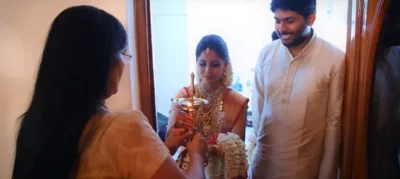
The groom’s family welcomes the bride and her husband in her new home at an auspicious hour. The new bride illuminates the path with a traditional lamp (Nilavilakku) while performing the Kudivep ritual. It is one of the most important Malayali wedding rituals. It is also believed that if the lamp drops from her hand, it is deemed unlucky for the family.
Valayidal
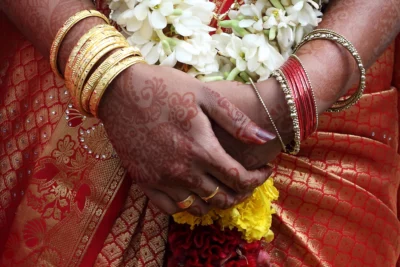
The groom’s family presents the bride with a set of bangles, which she wears as a token of her wedded status. Bangles are typically made of gold and are seen to be auspicious and a symbol of prosperity.
Sthreedhanam
Sthreedhanam is the ritual where the bride’s family showers her with gifts such as gold, land, and other expensive items. These presents are given as a gesture of love and support to the bride, ensuring her financial security and well-being in her new home.
Sambandham
Sambandham is an elaborate ritual after the wedding where the couple visits and seeks blessings from relatives and well-wishers who were unable to attend the wedding. The couple accepts their blessings, presents, and heartfelt wishes, reinforcing the bonds of affection and support in their life. With this, the elaborate marriage rituals come to an end, marking a new beginning for the newlyweds.





